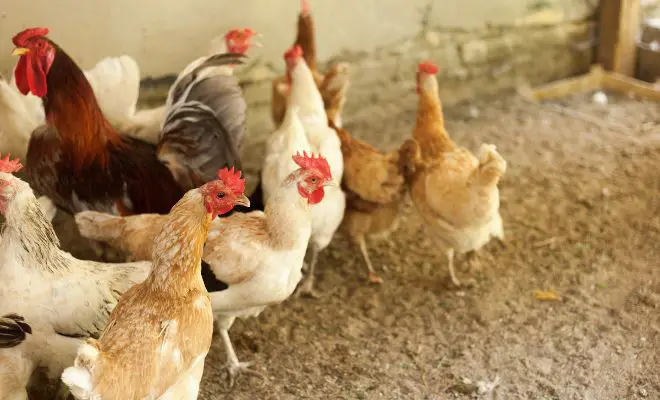Protein Treat: How to Raise Mealworms for Chicken Feed?

Mealworms might not be the most visually appealing creatures for our backyard chickens. But they’re a protein-packed delicacy for them! If you’re looking for a cost-effective and sustainable way to provide nutritious food, consider raising mealworms right at home.
But How to Raise Mealworms for Chicken Feed?? Grab a container, fill it with bedding like wheat bran, and add starter mealworms. Toss in some veggie scraps for food, and watch your mini-farm grow! Soon, you’ll have a steady supply of happy hens and a lighter wallet.
Store-bought worms are also available for you! To learn where to find it, have a look at the main section of this article.
Table of Contents
Raise Mealworms for Chicken Feed: Is Raising Worth It?

Yes, Mealworms are a fantastic protein-rich treat for chickens.
But is raising your own a worthwhile endeavor? Here’s a breakdown to help you decide.
Pros of Raising Mealworms
- Raising mealworms is cheaper than buying them regularly.
- Homegrown mealworms offer a natural protein boost for your chickens.
- Creating a mini-ecosystem and watching your mealworm colony thrive can be a fun project.
- Reduce waste by feeding your chickens leftover fruits and veggies to the mealworms.
Cons of Raising Mealworms
- Mealworms require regular feeding, cleaning, and potential temperature control.
- You’ll need a starter container, bedding, and mealworms to get started.
- While not a massive footprint, a dedicated container is needed for the mealworm colony.
- Mealworms are a treat, not a replacement for a balanced chicken feed.
Is it Worth It?
If you enjoy a hands-on approach and want to provide your chickens with a healthy, cost-effective treat, mealworms is worth it. However, if you’re short on time or space, buying them occasionally might be a better option.
Steps to Breed Mealworms for Chickens Feed
Breeding your own mealworms is not only cost-effective but also fun and educational. Here’s a simple guide to breeding your mealworm –

Step 1. Gather Your Supplies
- Container with ventilation holes (plastic bin with drilled holes)
- Bedding (wheat bran, oatmeal, or a mix)
- Starter mealworms and beetles (can be purchased online or at pet stores)
- Food scraps (fruits, vegetables)
- Egg carton or cardboard pieces (optional)
Step 2: Set Up the Container
Line the container with 2 to 3 inches of substrate. Place your starter stock of mealworms in the bin.

Add slices of apple, carrot, or potato on top of the substrate to provide moisture for the mealworms. Secure the lid on top of the container.

Step 3: Feeding and Maintenance
Regularly check the container to ensure the substrate remains moist. Add water as needed. Maintain a cool, dry, and well-ventilated environment for the mealworms.
Keep an eye on temperature and humidity levels inside the container.
Step 4: Harvesting Mealworms for Chickens
As the mealworms grow and reproduce, you can harvest them for your chickens. The time it takes to raise mealworms varies based on factors like temperature and initial colony size.
During summer, it may take 8 to 10 weeks on average. In winter, with lower temperatures, it could take up to 5 months.
However, the following video can help you grow mealworms –
Why Consider Mealworm to Raise? 5 Nutritional Facts
There are many reasons to consider raising mealworms for your chickens. The biggest perk lies in their incredible nutritional value. Here’s what makes them a stellar addition!
- Protein Powerhouse: Mealworms are packed with protein, essential for healthy growth, strong muscles, and vibrant feathers in your chickens.
- Fat for Energy: They contain healthy fats, providing your chickens with a sustained energy source for foraging and laying eggs.
- Vitamin Boost: Mealworms offer a good dose of vitamins, including B12, which supports a healthy nervous system and overall well-being.
- Mineral Blessing: These tiny treats are surprisingly rich in minerals like iron, important for healthy blood and oxygen flow in your chickens.
- Easy Digestion: Mealworms are readily digested by chickens, allowing them to absorb the nutrients efficiently.
What are the best worms to raise for chickens?
Mealworms are the top choice for chicken feed with high protein. They are easy to grow and maintain. You only require –
- Minimal space and care
- Readily available starter cultures and
- Breeding information.
Properly maintained mealworm bins produce minimal odor, making them ideal for backyard setups.
What is a natural worm for chickens?
Earthworms offer a natural alternative. They are best used as occasional treats due to collection difficulties and potential parasite concerns.
However, it’s crucial to avoid feeding chickens composting worms like red wigglers. It’s because they may lack the necessary nutrition.
Related Articles:
Mealworms for Chickens for Sale: Where Can I Find It?

Mealworms are readily available as chicken feed. But where to find it?
Many online retailers sell live mealworms or starter cultures for breeding your own colony. Search for “mealworms for chickens” or “mealworm starter cultures.”
So many pet stores carry live mealworms as food for reptiles and other insectivores. Check the feeder insect section, they might also have starter cultures for breeding.
Farms and feed stores that cater to poultry or backyard chickens might also sell mealworms as a treat or feeder insect.
Note: It’s recommended to grow mealworms for chickens. Store-bought mealworms can cost around $3.50 per pound. Breeding your own reduces that to mere cents per pound.
How to Feed Mealworms to Chickens?
Mealworms are a healthy protein snack for chickens, but knowing how much and how often to feed them is key. So, check out the guide I am sharing –
How Many Mealworms to Feed Your Chickens?
Moderation is key! Mealworms are a treat, not a staple. Overfeeding can lead to nutritional imbalances.
Begin with a small amount (10-15 mealworms per chicken) 1-2 times a week.
Monitor their behavior and adjust the quantity based on their enthusiasm. Age, breed, and laying status can influence how much your chickens need. Growing chicks and laying hens may require slightly more.
Can Chickens Eat Mealworms Every Day?
No. While tempting, daily mealworm treats are not recommended. Rotate treats like mealworms with other healthy options like fruits and vegetables.
Can I Offer Dried Mealworms to Chickens?
Dried mealworms offer a convenient alternative to live ones. To feed, soak dried mealworms in water for a few minutes before feeding to prevent dehydration.
Remember, dried mealworms have slightly less protein than live ones. Adjust the quantity accordingly.
Tip: Scatter the mealworms in the coop bedding to encourage natural foraging behavior in your chickens. You can place mealworms in shallow plastic, too. Every 1 to 2 weeks, separate beetles from the bedding to prevent them from eating the eggs or tiny worms.

FAQs
You can also check the following queries when raising mealworms for chicken feed.
Q. How many times to make a mealworm farm for chickens?
You only need one mealworm farm. It’s self-sustaining with proper care.
Q. Do I need to separate the mealworms from the beetles?
Not necessarily, the beetles lay eggs that become mealworms. But occasional separation might be needed.
Q. Can raising mealworms attract pests?
Yes, improper storage and hygiene can attract unwanted insects. Keep it clean and sealed.
Q. Do mealworms smell?
Generally, mealworms have a mild, earthy scent. It has a minimal smell if maintained well. Remove moldy food and clean regularly.
Final Say
Raising mealworms for chicken feed offers numerous benefits for backyard poultry enthusiasts. With their high protein content and ease of maintenance, mealworms provide a cost-effective and sustainable source of nutrition for chickens. While other natural options like earthworms exist, mealworms reign supreme due to their nutritional value.
Breeding mealworms at home can be a rewarding and educational experience. Overall, incorporating mealworms into a chicken’s diet can enhance their health and well-being. So, it can be a great way to offer healthy treats for poultries!






